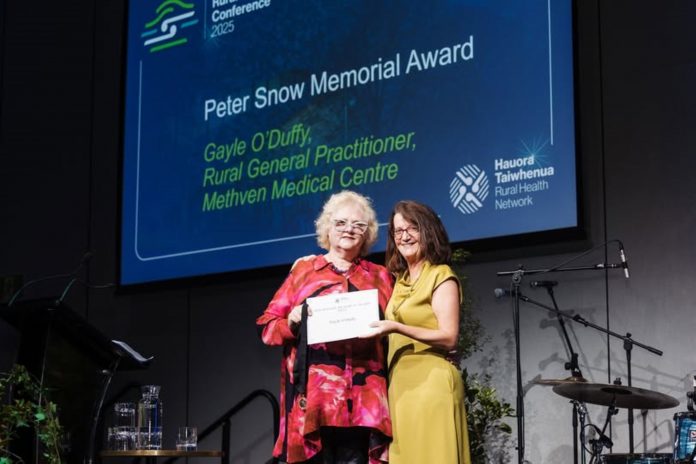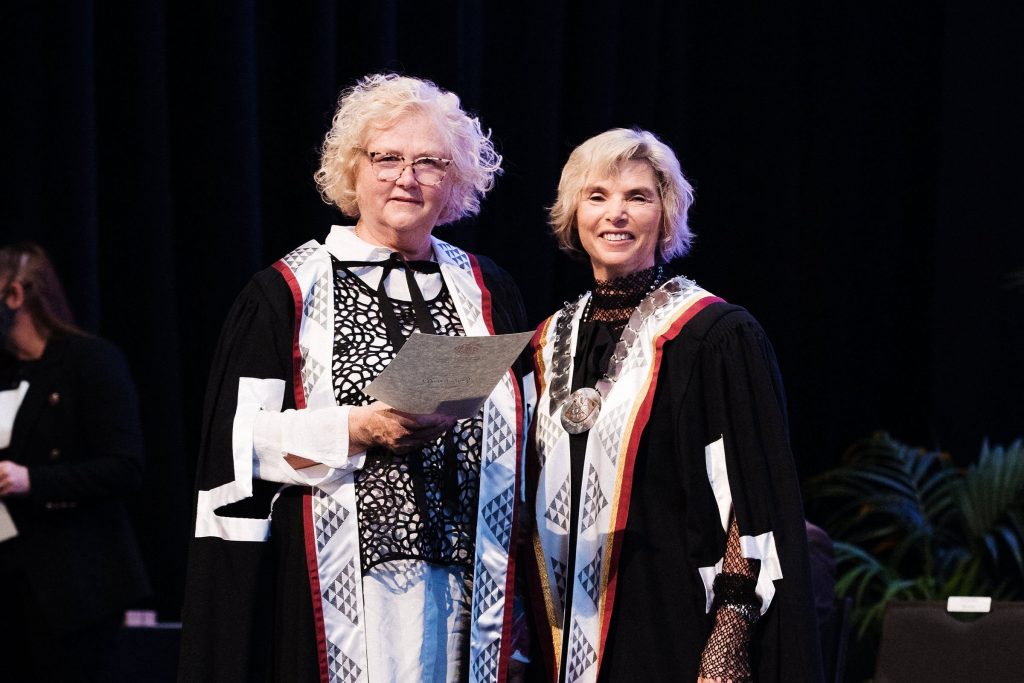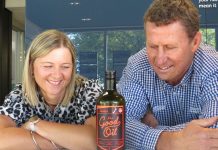
In 1977 Australian Gayle O’Duffy visited Methven on her honeymoon.
She and her husband liked the town and thought they might come back to live there one day.
Fast forward five years, and with an enjoyment of skiing, Dr O’Duffy – who trained at the Brisbane University – was happy to become a locum in Methven in 1982.
She enjoyed it so much, the family home was sold and a permanent move was made to Methven. Forty-two years later and O’Duffy is still practising medicine in Methven.
O’Duffy, 67, co-owns the Methven Medical Centre with Kathryn Hellyer and Dr Laura Pfeifer.
Earlier this month she was attending the dinner at the National Rural Health conference in Christchurch; two awards were due to be presented.
Much to O’Duffy’s surprise her name was read out as the recipient of the Peter Snow Award, with the Te Waka Kotahitanga award presented to Dr Rachel Pearce – Te Whatu Ora.
The award recognises her decades of dedicated service to the Methven community.
The citation for O’Duffy award said ‘‘A quietly determined and humble leader, Gayle’s influence has extended beyond clinical practice, serving as Clinical Lead – Rural for Pegasus from 2014 to 2024.
Originally trained in Queensland, Gayle embodies the values of rural service, compassion, and commitment that this award was created to celebrate.
‘‘Gayle exemplifies everything the Peter Snow Award stands for — dedication, integrity, and a deep understanding of what it means to serve rural communities. Her contribution over the years is immeasurable, and this recognition is richly deserved.’’
O’Duffy said it was totally unexpected.
‘‘I was humbled to receive the award. To have your peers in the rural clinical community recognise your achievements is huge. I wanted to cry,’’ O’Duffy said.

As the congratulations flowed, O’Duffy said one comment that took her by surprise was to hear from former students under her tutorship around the country speak of what they had learnt from the time they spent with her.
While O’Duffy has been trying to retire for a few years she has reduced the number of patients she is seeing while still being involved in the running of the practice.
‘‘Its a gradual process, the move out and it’s about succession planning,’’ O’Duffy said.
While planning was under way for the new medical centre when O’Duffy arrived, describing herself at the time as a baby doctor, she enjoyed being part of the planning and certainly the move into it on Anzac weekend 1985.
Prior to the new centre being built the town’s Dr John McGettigan lived in a house owned by the council that included three rooms that were the medical practice.
A driving force behind the establishment of the new practice was to provide a space for allied health professionals to be working alongside the medical team.
When O’Duffy arrived the teams was two doctors, two nurses and a receptionist, today the team of 25 includes four doctors, five nurses and health care assistants who serves a growing community.
The health care assistants who are ‘worth their weight in gold’ undertake duties to free up the doctors and nurses to undertake other work. These duties includes tests, sterilising equipment and assistance with minor surgeries
While the practice is located in a rural setting that doesn’t mean it is remote or disconnected from the latest in the medical field. The Methven Medical Centre has students from Otago University. As part of their time they observe how medical professionals in a rural setting fit together.
Being involved in the teaching programmes keeps O’Duffy passionate about her work.
‘‘Working in rural medicine means there is a risks of becoming isolated but being part of the programmes means this isn’t the case and we have to keep up-to-date to pass the knowledge on to the students.
“The programme is a two-way process as we learn from the students as well. There have been times when we come across something unusual and I will say I haven’t seen this for 10 years so let’s learn about this together,’’ O’Duffy said,
Ashburton hospital is a rural immersion centre so fifth year medical students from the centre send time at Methven.
A placement at the immersion centre means students ‘‘deal with whatever comes through the door’’ while those students on placement at tertiary hospitals in Dunedin, Wellington and Christchurch focus on a particular area such as neurology for six weeks before moving to another area.
‘‘It is interesting that students who undertake the immersion centre training have exceptional results,’’ O’Duffy said.



